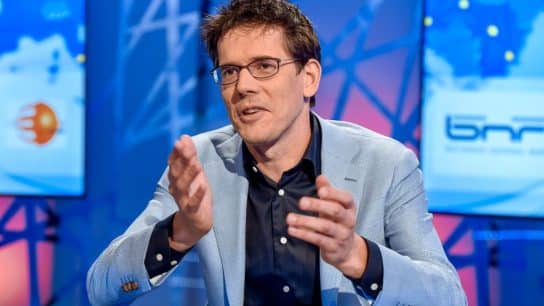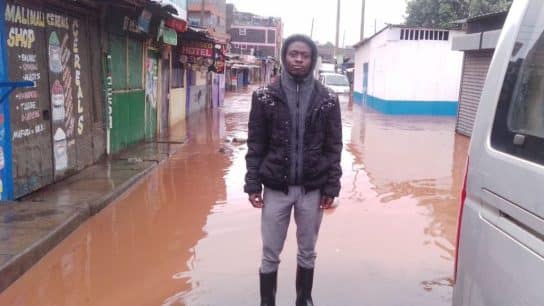Over 400 million people will be called to the polls between June 6 and 9 to elect 720 politicians that will sit in the European Parliament for the next five years. In an exclusive interview with Earth.Org, Bas Eickhout, lead candidate of the European Greens Party (EGP), discusses how recent farmers protests dealt a blow to the EU’s green agenda and what is at stake at the upcoming elections.
—
This is part 1 of a two-part interview with Bas Eickhout. Read part 2 here.
The adoption of the Green Deal in 2020 was Europe’s “man on the moon moment,” as described by European Commission President Ursula von der Leyen. It set an ambitious, legally-binding target to achieve a 55% reduction in emissions by 2030 and carbon neutrality by mid-century, and spurred the 27-nation bloc to begin decarbonizing Europe’s energy system, promoting sustainable agricultural practices, buildings, mobility, and packaging; reducing plastic pollution; combating greenwashing, and protecting biodiversity.
The Green Deal was established just a few months after the last European Parliament elections, when, in a surge of support, 74 Green members were elected under the leadership of Dutch MEP Bas Eickhout and his colleague Ska Keller.
But Eickhout now warns that the deal is under threat, with recent changes in the EU’s political landscape hindering, or even reversing, progress. Last year, many European countries, including Germany, Poland, the Netherlands, Hungary, Spain, and Italy, witnessed a notable rise in far-right movements and climate sceptics challenging the political landscape and raising concerns about the future of European unity and environmental policies.
“A lot is at stake at this election,” Eickhout, a key figure during the Green Deal negotiations, told Earth.Org in April. The Dutch MEP was recently elected alongside German MEP Terry Reintke to steer the European Greens’ campaign for June’s EU election.
He said the rise of the far-right threatens the EU’s values and principles: “The future of the Green Deal is at stake. The fight for our democracy, rule of law, international solidarity, and our own security. Everything that is important for Europe is now at risk.”
Europe Is ‘Unprepared’ for Climate Risks
Despite initially positioning the EU at the forefront of climate action globally, many policies under the Green Deal have encountered fierce resistance from political parties, member states, and groups of European citizens whose livelihoods were directly impacted by the reforms. The most recent example is a series of sustainable policies aimed at revamping the €55 billion (US$59.4) Common Agricultural Policy (CAP), the EU’s oldest and costliest policy that implements a system of agricultural subsidies and other programmes.
European farmers reacted to the CAP revision package with months-long protests. They argue the new policies – such as new crop rotation rules, requirements to cut fertiliser use by at least 20%, and moves to requiring at least 4% of arable land remain fallow or unused to promote biodiversity – will harm their competitiveness with states that have less stringent environmental regulation.
More on the topic: Explainer: Why Are European Farmers Protesting?
“Farmers’ protests are logical,” said Eickhout. “Just look at the last 15 to 20 years. One third of agriculture farmers have disappeared. Not that we have less agricultural area, we just have less farmers. And what’s the consequence? Farmers need to produce more and more to have an honest living out of it.”
“Our subsidy system is further intensifying our large-scale agriculture because the more area you have the more money you get. European policies are pushing towards larger farming that also quite often means more monoculture agriculture; this is a system that is not helping any farmer… they have to produce more and more, they are pushed into a situation that they don’t want either. It’s also bad for the environment and it’s not preparing ourselves for the climate,” the MEP said.
The unsustainable agricultural practices that Eickhout condemned have long been the object of criticism among environmentalists and were at the centre of a recent report by the European Environment Agency (EEA), the first-ever study on climate risks facing the bloc, published earlier this year.
According to the independent agency, current EU policies related to food production, fishery, and agriculture, such as the CAP, fail to adequately address climate risks and adaptation needs of the agricultural sector, one of most vulnerable to climate change-related threats such as rising temperatures, droughts, and floods.
The impact is evident in various crops within the bloc.
The EU’s overall cereal production for the current season is expected to be 4.3% below the 5-year average, primarily due to adverse weather conditions and a mild winter. Additionally, heavy rains delayed harvests and caused waterlogged wheat crops in parts of France, Germany, and Poland. The unusually wet conditions also fuelled fungal diseases that affected apple and pear yields in Italy and Greece.
In 2021, wine production was 5% below the 5-year average and 8% lower than the previous year, primarily due to extreme weather conditions. France experienced a significant 19% decrease in production due to late spring frosts, while Spain saw a 14% drop in wine production compared to 2020. The olive oil industry is also suffering, with production reaching a record low in the 12 months leading up to June 2023, largely due to droughts and pests.
Large-scale agriculture and farming methods such as monoculture reduce the availability of certain nutrients and degrade the soil in the long term, contributing to environmental degradation and accelerating global warming. And for a place like Europe, the fastest-warming continent in the world, time is running out to reverse course.
And while it is true that the agricultural sector plays a strategic role in the food security of the entire continent, its environmental impact cannot be understated. Agriculture is the fourth-largest in terms of greenhouse gas emissions in the EU, and it is among the sectors that have seen the least progress in terms of mitigating its environmental impacts since 1990.

The EEA report concluded that the EU is unprepared for climate risks and sent a blunt message to the bloc: take decisive, coordinated action now or face critical – if not catastrophic risks – by the end of this century. To avoid existential risks, the agency argues that the approach has to shift towards “crucial” adaptive strategies such as diversified agricultural approaches and sustainable agricultural models.
“Farmers have very good reasons for protesting but we also have big problems in our agricultural system. We need to talk about our economic system, our free trade deals, our subsidies, and prepare for climate adaptation. All these elements mean a totally different agricultural policy. We understand farmers’ issues but the solutions Europe is working on are counter-productive and short-term,” said Eickhout.
Backtracking
After an initial delay of the new policies in response to widespread protests by European farmers, EU lawmakers in April approved a watered-down review of certain acts of the CAP with 425 votes in favour, 130 against, and 33 abstentions.
Addressing the Parliament ahead of the final vote on the CAP revision in late April, Eickhout called out conservatives and right-wing politicians, blaming them for “weakening and watering down” the bloc’s green legislation.
“Remember 2020 when this house in a full majority said ‘there is a state of climate emergency’? Those were the days where also the conservatives were very clear, making the point ‘we need urgent action on climate’. And what have we seen? We’ve seen stalling; we’ve seen pressuring,” he said.
Besides reducing green conditions required to receive CAP funding, the CAP simplification package includes exemptions from checks for farms under 10 hectares, which represent 65% of subsidy beneficiaries and approximately 10% of the total agricultural area. A requirement to set aside a portion of land to promote biodiversity was scrapped altogether.
“This targeted review of the common agricultural policy is a concrete result of our efforts to cut red tape and ensure simplification for farmers. The adoption comes only two months after the proposal was presented by the Commission. This clearly demonstrates we are delivering on the promises we have made to European farmers,” said David Clarinval, Belgian Deputy Prime Minister following the Council’s adoption of the package last week.
Speaking on an Italian political talk show earlier this month, Commission President Ursula von der Leyen defended the decision, saying the EU is working with farmers to reach its sustainability targets. “We want to preserve the nature in which we live… Young people would never forgive us if we gave up on this challenge. We created the rules, now we need to implement them. We must ask industry, small and medium-sized businesses, and farmers what they need to together achieve the common goal of preserving nature for the next generation,” she said.
But for many, these changes represent an attempt to weaken a package of measures that took months of negotiation between the 27 member states and to put a stop to months of protests that have brought Brussels to its knees. Greenpeace EU Agriculture Policy Director Marco Contiero said the move “shreds the last scraps of credibility that the EU’s farm policy protects the environment and the public interest.”
“Droughts have ruined harvests across southern Europe, some of the wettest months on record are doing the same in the north. Most farmers are rightly demanding a fair income, and to be protected from a ruthless market dominated by some major players who squeeze them for every cent. Throwing the last protections for nature in Europe’s countryside into the thresher won’t save farmers, and will leave us all more vulnerable to extreme weather wrecking crops and livelihoods,” Contiero said in a statement.
For Eickhout, the Commission’s U-turn was “short-sighted.”
“Farmers’ protests were a test for Europe and the future of the Green Deal and the EU has failed miserably. This is what you get if you don’t have a long-term vision. The Commission is just panicking,” said Eickhout.
“The climate resilience report of the EEA showed us that Europe is not prepared for climate extremes and the conclusion was very clear. The Commission said they fully agreed with the report and a few days later, they presented their weakened environmental revisions of the CAP. It was the most bizarre moment I have ever witnessed. The hypocrisy and stupidity of the Commission was never more apparent than in that week,” the MEP said.
Powerful Lobby
Eickhout also argued that farmers are wrongfully targeted as the main culprits behind Europe’s unsustainable agricultural practices when – in reality – powerful lobbyists along the entire food chain, including the agro-chemical industry pushing for fertilisers and pesticides, have allowed such practices to spread.
“The power doesn’t lie with the farmers, it lies with the input industry of fertilisers, chemicals, etc… and it lies with the retailers and supermarkets. Farmers are squeezed between those powers,” he said.
“I think we have not made this narrative strong enough and this has allowed some farmers to go along with the narrative that policies and the Greens are your problem.”
The MEP said his party is open to dialogue with farmers who realise that something needs to change and reject the call of farming lobbies to keep the status quo.
“We do not have clarity. I think we, as Greens, should offer a clearer vision – some self-criticism is important as well. We will not be capable of convincing 100% of the farmers community but I do think more and more farmers do realise that this system is not sustainable. Those are the innovative farmers we want to talk to and liaise with.”
Featured image: euranet_puls/Flickr
This story is funded by readers like you
Our non-profit newsroom provides climate coverage free of charge and advertising. Your one-off or monthly donations play a crucial role in supporting our operations, expanding our reach, and maintaining our editorial independence.
About EO | Mission Statement | Impact & Reach | Write for us


















